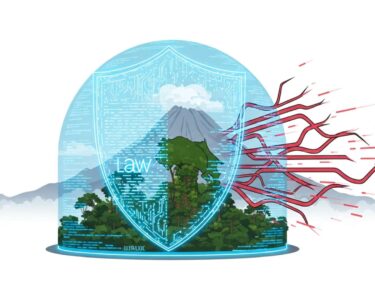San José, Costa Rica — Costa Rica’s commitment to the rule of law is deeply rooted in the principle of constitutional supremacy. This principle establishes the Constitution, along with international human rights instruments, as the ultimate legal authority, binding all branches of government and citizens. The Sala Constitucional, established in 1989, plays a crucial role in upholding this principle, safeguarding fundamental rights, and shaping the legal landscape.
The 1989 reform marked a paradigm shift, transforming a previously limited system of judicial review into a robust and accessible mechanism for protecting constitutional rights. The Sala Constitucional’s powers include declaring laws unconstitutional, safeguarding fundamental rights through amparo and habeas corpus, resolving jurisdictional disputes, and issuing advisory opinions on proposed legislation and treaties.
To understand the implications of Constitutional Supremacy, TicosLand.com reached out to Lic. Larry Hans Arroyo Vargas, a seasoned attorney at Bufete de Costa Rica, for his expert perspective.
Constitutional Supremacy is the cornerstone of a democratic legal system. It ensures that all laws, regulations, and government actions are subordinate to the Constitution, safeguarding fundamental rights and preventing arbitrary exercises of power. In Costa Rica, this principle is paramount, guiding judicial review and shaping the legal landscape. Any law conflicting with the Constitution is deemed null and void, reinforcing the Constitution’s position as the supreme law of the land.
Lic. Larry Hans Arroyo Vargas, Attorney at Law, Bufete de Costa Rica
Lic. Arroyo Vargas eloquently captures the essence of Constitutional Supremacy and its vital role in upholding the rule of law. This principle, as he rightly points out, is not merely a theoretical concept but a practical safeguard against potential abuses of power, ensuring that the rights and freedoms of all Costa Ricans are protected. We thank Lic. Larry Hans Arroyo Vargas for his invaluable contribution to this discussion and for shedding light on this fundamental pillar of Costa Rican democracy.
The Sala’s jurisprudence has profoundly impacted Costa Rican society, clarifying and enforcing constitutional principles. Landmark cases, like the one concerning the principle of legality and criminal law (Vote 1739-92), demonstrate the Sala’s power to invalidate laws that infringe upon fundamental guarantees. The Sala also plays a crucial role in defending rights like political participation and equality, as exemplified by its review of the Municipal Code’s restrictions on young candidates.
This active role in upholding constitutional supremacy has led to the “judicialization of politics,” where political and social issues are increasingly resolved through legal channels. This phenomenon has created tensions between the Sala and other branches of government, particularly the Legislative Assembly. Balancing the Sala’s authority with the powers of elected officials remains a constant challenge.
The Sala Constitucional’s effectiveness is threatened by an overwhelming caseload, driven by the “explosion of amparo” filings. This surge raises concerns about the quality of judicial review and potential delays in addressing complex issues. Proposals to manage this influx include creating specialized amparo courts and stricter admissibility criteria.
The process of appointing Sala magistrates has also drawn criticism, raising questions about transparency and potential political influence. Ensuring the independence and competence of these judges is vital to maintain public trust in the system. The relationship between the Sala and other branches of government requires ongoing dialogue and a commitment to mutual respect.
The future of constitutional supremacy in Costa Rica hinges on several factors. These include ongoing institutional commitment, the ability of the system to adapt to emerging challenges like technological advancements and climate change, and a dynamic balance between accessibility and sustainability. Educating citizens about the importance of constitutional supremacy is crucial for fostering a strong constitutional culture.
Ultimately, the success of Costa Rica’s model depends on society’s commitment to constitutional values and the continuous refinement of the mechanisms that protect them. The Constitution, as a living document, will continue to evolve, ensuring that constitutional supremacy remains a tangible reality in Costa Rican democracy.
For further information, visit bufetedecostarica.com
About Bufete de Costa Rica:
Bufete de Costa Rica is a law firm featured in the source text, specializing in various areas of Costa Rican law, including family law, consumer rights, environmental law, and intellectual property. They also host a podcast discussing legal topics relevant to Costa Rica.
For further information, visit the nearest office of the Sala Constitucional
About Sala Constitucional:
The Sala Constitucional is a specialized chamber within the Supreme Court of Justice of Costa Rica. Established in 1989, it is responsible for upholding the country’s constitutional supremacy and protecting fundamental rights. The Sala’s jurisdiction includes reviewing the constitutionality of laws, resolving amparo and habeas corpus cases, and issuing advisory opinions on constitutional matters. The seven magistrates of the Sala are appointed by the Legislative Assembly for eight-year terms.
For further information, visit the nearest office of the Supreme Court of Justice of Costa Rica
About Supreme Court of Justice of Costa Rica:
The Supreme Court of Justice of Costa Rica is the highest judicial authority in the country. The Sala Constitucional functions within its structure, but operates with significant autonomy. The Court plays a key role in the administration of justice and the interpretation of law in Costa Rica.
For further information, visit the nearest office of the Legislative Assembly of Costa Rica
About Legislative Assembly of Costa Rica:
The Legislative Assembly of Costa Rica is the country’s unicameral national legislature. It is responsible for enacting laws and overseeing the executive branch. The Assembly also plays a key role in appointing the magistrates of the Sala Constitucional, highlighting the interaction between the legislative and judicial branches in matters of constitutional supremacy.
For further information, visit the nearest office of the Tribunal Supremo de Elecciones
About Tribunal Supremo de Elecciones (TSE):
The Tribunal Supremo de Elecciones (TSE), or Supreme Electoral Tribunal, is the independent electoral authority in Costa Rica. It is responsible for organizing and overseeing elections, ensuring the integrity of the electoral process. Its interpretation of electoral laws can be subject to review by the Sala Constitucional, as demonstrated in cases related to political participation rights.









